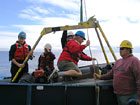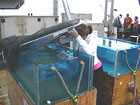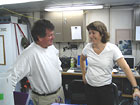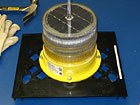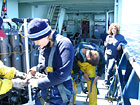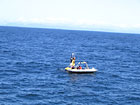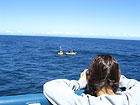

 | ||||||||||||||||||||||||||||||||
|
|
Journals 2005/2006Denis Costello
July 16, 2005 Our day began with an exchange of science crew at Neah Bay. The skies were thick with low level clouds and the water was littered with small fishing boats. Dr. Trick, Dr. Lessard, Susan Geier, Peggy Hughes and Shelly Nance left us and we picked up Dr. Trainer, Bill Nitsche, Alan Sarich and Andy Ohana-Richardson. The process took three trips and about an hour and a half. After the new crew boarded the Atlantis, they were introduced to rest of the science crew and were brought up to speed on what was going on. Dr. Trainer is now the number one principal investigator behind Dr. Hickey. Bill is an employee at NOAA, Alan works for the Washington State Dept. of Fish and Wildlife and Andy is a graduate student at the University of Oregon. Their arrival spells me from working on the deck with the CTD. This will allow me more time to prepare for sampling and to help other groups with their work. It has been difficult for us to keep up with chlorophyll readings. The combination of a rocking vessel and the fumes of the acetone leave the reader with symptoms of seasickness.
Not long after switching crew, Julian and Amy were asked by Dr. Hickey to replace the non-functioning light on the EH3 mooring in the Juan de Fuca eddy. This mooring is property of the ECOHAB Project and was placed there to monitor conditions within the water column. So Julian and Amy suited up in safety harnesses and got into the small water craft and headed toward the mooring. The Atlantis was only about 100 meters away from the mooring so their transit was short. When they got to the mooring, they found climbing out of the boat onto the mooring to be difficult because of the rocking sea. The stronger winds caused the swell to grow. Changing the light took roughly 45 minutes. While on the mooring, Julian and Amy had to hold onto the frame of the mooring with one hand while using the free had to work. Together, Julian and Amy acted as a pair of hands, working on the light while the mooring rocked back and forth.
After Julian and Amy changed the light, the Atlantis steamed toward the OZ line for sampling along the Washington shelf. This would be the end of our survey as we planned to start the grid tomorrow at the GH line. Once we are on the grid, we will sample every hour, completing all 12 grid lines by July 23rd. The day ended with a gathering on the back deck. It was fun to have the entire science crew and some of the ship's crew come together if for just a few hours. We knew that tomorrow would be busy. |
|||||||||||||||||||||||||||||||
